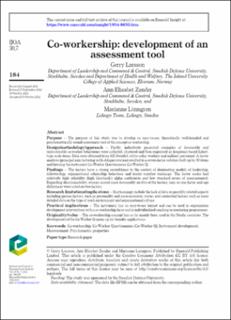Co-workership: development of an assessment tool
Peer reviewed, Journal article
Published version
Permanent lenke
https://hdl.handle.net/11250/3051784Utgivelsesdato
2022Metadata
Vis full innførselSamlinger
Originalversjon
International Journal of Organizational Analysis. 2022, 30 (7), 184-195. 10.1108/IJOA-08-2022-3377Sammendrag
Purpose The purpose of this study was to develop an easy-to-use, theoretically well-founded and psychometrically sound assessment tool of the concept co-workership. Design/methodology/approach Firstly, inductively generated examples of favourable and unfavourable co-worker behaviours were collected, clustered and then expressed as frequency-based Likert-type scale items. Data were obtained from 825 Swedish white collar workers and military personnel. A factor analysis (principal axis factoring with oblique rotation) resulted in a seven-factor solution built up by 30 items and forming the instrument Co-Worker Questionnaire (Co-Worker Q). Findings The factors have a strong resemblance to the content of dominating models of leadership, followership, organizational citizenship behaviour and leader–member exchange. The factor scales had relatively high reliability (high Cronbach’s alpha coefficients and low standard errors of measurement). Regarding discriminability, women scored more favourably on five of the factors, men on one factor and age differences were noted on two factors. Research limitations/implications Shortcomings include the lack of data on possibly related aspects including person factors, such as personality and socio-economic status, and contextual factors such as more detailed data on the type of work environment and organizational culture. Practical implications The instrument has an easy-to-use format and can be used in organization development interventions with a co-workership focus and in individualized coaching or mentoring programmes. Originality/value The co-workership concept has so far mainly been used in the Nordic countries. The development of the Co-Worker Q opens up for broader applications.

